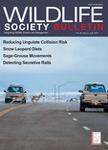版权所有:内蒙古大学图书馆 技术提供:维普资讯• 智图
内蒙古自治区呼和浩特市赛罕区大学西街235号 邮编: 010021

作者机构:Colorado State Univ Dept Fishery & Wildlife Biol Ft Collins CO 80521 USA Wildlife Inst India Dehra Dun 248001 Uttar Pradesh India
出 版 物:《WILDLIFE SOCIETY BULLETIN》 (野生动物学会通报)
年 卷 期:2006年第34卷第1期
页 面:59-68页
核心收录:
学科分类:0710[理学-生物学] 07[理学] 071002[理学-动物学] 0713[理学-生态学]
主 题:adaptive cluster sampling amphibians India rainforest reptiles sampling efficiency simple random sampling species richness rainforest
摘 要:We sampled forest floor herpetofaunal communities in a monsoonal rainforest in South India for three consecutive years to evaluate the use of cluster sampling in estimating species composition and density, Our initial experimental design consisted of comprehensive random searches of multiple 25m(2) quadrats (SRS) for animals. After our initial season we found that most quadrats had zero animals detected and, when encountered, animals were spatially aggregated. To increase sampling efficiency and derive more precise density estimates, we shifted to adaptive cluster sampling (ACS). We compared the relative sampling efficiencies of ACS to SRS and the ability of the 2 methods to detect rare species. Adaptive cluster sampling failed to yield the more precise density estimates as predicted by statistical theory. However, ACS yielded more individual and rare species detections. Our results suggest the ACS assumptions should be carefully evaluated prior to use because it may not be appropriate for all rare, spatially aggregated populations.